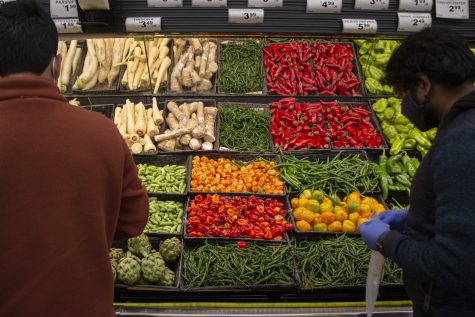Opinion: The key to preventing a future pandemic is in changing the way we treat animals
August 20, 2021

It is still unclear whether humans first contracted COVID-19 in a lab or in the wildlife trade market in China.
What we do know is COVID-19 has zoonotic origins, meaning that if we weren’t using animals for research or as food, we might not be where we are today.
This is not only true for COVID-19, but also many other zoonotic diseases — diseases with animal origins — in the world such as Ebola, bird flu, swine flu, salmonella and E. coli, among others.
Dr. Aysha Akhtar is a public health specialist and CEO of the Center for Contemporary Sciences, an independent nonprofit organization that focuses on reducing the use of animals for scientific experimentation by advancing human-specific research and testing methods. Akhtar said she predicted this pandemic in 2014.
“I wasn’t the only one, many other scientists and doctors have been saying for quite some time … that our relationship with other animals is increasing our risk for infectious diseases and will likely be the cause of the next pandemic,” Akhtar said.
A study conducted by the National Center for Biotechnology Information reviewed workshops conducted by the U.S. Centers for Disease Control and Prevention between 2014 and 2016, before the COVID-19 pandemic. The study found up to 75% of new or emerging infectious diseases came from animals, accounting for 15.8% of all deaths and 43.7% of deaths in low-resource countries. This resulted in about 2.7 million human deaths worldwide each year, the study found.
Akhtar said one of the reasons the risk of infectious diseases is so high among humans is because of how animals are treated in factory farms and the wildlife trade market.
According to Akhtar, animals are being jammed into very small spaces in extreme temperatures and are put under very stressful conditions for their meat, milk and fur, which weakens their immune systems, leading to diseases that are easily caught and spread.
“How we treat animals comes back to affect us in every way, whether directly or indirectly,” Akhtar said.
Akhtar said one of the most significant changes we can individually make to prevent new diseases is through a vegan lifestyle.
“The only way we’re really going to end factory farming though, is if the demand for meat, eggs and dairy goes down, and that means that each of us has to make a decision about who or what we choose to eat,” Akhtar said.
According to Dr. Michael Klaper, an internationally-recognized doctor and educator, going vegan is also one of the most effective decisions we can make to prevent getting seriously ill. He also credited a vegan lifestyle with reducing the risk of getting the vast majority of degenerative and fatal diseases like cancer, diabetes, heart attacks and more that can result from a Western style of eating.
“The vast majority of degenerative diseases that take so many lives and cause so many trillions of dollars around the world, are largely the result of the Western style of eating,” Klaper said. “A whole food plant based diet that has the ability to reverse these diseases.”
A study conducted by the BMJ Nutrition Prevention & Health found that people who follow a plant-based diet have a 73% less chance of experiencing a moderate-to-severe case of COVID-19, compared to participants who did not follow a plant-based diet.
“In the 21st century, adopting a plant-based diet is the healthiest, most loving, most sane, most compassionate, most sustainable thing that we can do, ” Klaper said.
Some of the biggest misconceptions about being vegan are that people are not getting enough nutrients and that a plant-based diet is expensive.
I personally have been vegan for seven months for all reasons: the animals, the environment, my genetically high cholesterol, and more recently, because I do not want another pandemic. I have not spent any extra money on food, and am probably saving money as I am cooking more, eating out less and not buying as many processed foods.
On top of that, my stomach is loving it and I overcame my cheese addiction.
According to Klaper, with the exception of vitamin B-12, a whole food, plant-based diet can provide all the necessary nutrients needed.
Foods like beans, chickpeas, lentils, rice, peanuts, sunflower seeds, pasta, fruits and vegetables that can provide a balanced vegan diet can be found for a low cost at stores like Aldi and Walmart, and local urban farms offering “pay what you can” programs and CSA boxes.
The COVID-19 pandemic has not been fun for anyone, so I doubt there is anyone who would want to go through it again. The good thing is, by changing the way we eat, we can actually help reduce the risk of another one, plus improve our individual and public health.
“A lot of the power is really in our hands, so if we choose one plate of food over another, we could significantly reduce our risk for the next pandemic,” Akhtar said.







